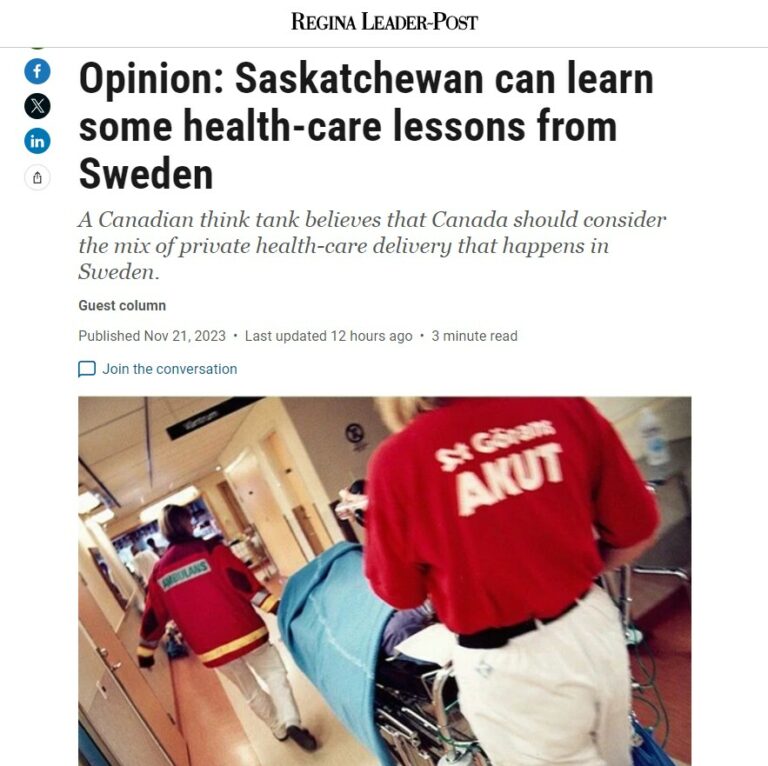Across Canada, our government-run system is often seen as a source of pride. This is especially true in Saskatchewan — the “birthplace of Medicare.” In 1947, Premier Tommy Douglas introduced the Hospital Insurance Act, creating the first province-wide universal health-care system in Canada.
REGINA LEADER-POST COLUMN: Saskatchewan can learn some health care lessons from Sweden

Countless pages of ink are spilled and hours are spent on TV and radio debating just how do we fix Canada’s broken health-care system.
Here’s a novel idea: look at other places with better care than ours.
This was expanded to care outside of hospitals in 1962.
Almost 80 years later, it’s clear that health care in our province and country is in crisis and in need of major reform. Fraser Institute research shows that wait times are at a 30-year high.
Data gathered by SecondStreet.org shows 343 patients died while waiting for surgery in the fiscal year 2021-22, among more than 14,000 nationwide — hip surgery, cardiac surgery, etc. The list of problems goes on.
Thankfully, Saskatchewan could, once again, play a big role in reshaping Canadian health care for the better. To start, we could look at some of the many universal health-care systems that perform better than Canada’s.
Take, for instance, Sweden. SecondStreet.org recently travelled to the Scandinavian country to learn how patients are able to get care more quickly while their nation spends about the same as Canada as a percentage of gross domestic product.
One of the most striking differences between the two systems is Sweden’s collaborative attitude to the private sector. In Canada, any provincial government attempting to expand private options is met with anger and rhetoric that “feels more like a nuclear arms race,” in the words of the Leader-Post’s columnist Murray Mandryk.
The Swedish government is willing to hire anyone — public or private — to provide health services, if they can provide effective treatment at a reasonable price. The Capio St. Göran hospital in Stockholm is a great example. It’s a government-owned hospital that is taxpayer-funded, but run by a private company.
SecondStreet.org spoke with its CEO, Gustaf Storm, who said they can provide care for around 30 per cent less than government-run facilities. Their health regions partner with countless private clinics to provide surgery and diagnostic scans.
Saskatchewan has been open to private partnerships in health care since premier Wall’s government implemented the Saskatchewan Surgical Initiative in 2010. This strategy helped reduce wait times, so it’s good to see the Moe government continue down this path.
But there’s more to learn from Sweden. For instance, there’s more accountability in their system. Patients are given a six-month “guarantee” for treatment. If the public system in their area hasn’t provided care within that time, they’re given the right to travel to another health region at no cost (except travel expenses.)
The simple idea of having a maximum wait time places urgency on the health system, something Saskatchewan could clearly benefit from.
Finally, in addition to the public system, Swedes also have the right to pay for private insurance or surgery at private facilities. About seven per cent of employed Swedes take this option. They can get care more quickly, and it’s also a benefit to those who choose not to pay for private care.
Gustaf Drougge, the chairman of a Swedish think tank called Synaps, summed it up simply. “Everybody’s paying for the big system, but then they’re paying extra just to be outside it. And they’re taking pressure off the big system.”
The Moe government could take a bold step and allow Saskatchewanians to pay for their own care if they choose. This, of course, might require a much-needed showdown with Ottawa on health policy.
The Swedish system is not perfect, but it consistently outperforms Canada for about the same price. If Saskatchewan were to take inspiration from the homeland of ABBA and Ikea, we could, again, become leaders in health reform and serve as a positive example for the rest of the country.
With so much suffering under the current system, could it really hurt to try?
Dom Lucyk is the communications director with SecondStreet.org, a Canadian think tank.
This column was originally published in the Regina Leader-Post on November 21, 2023.
You can help us continue to research and tell stories about this issue by making a donation or sharing this content with your friends. Be sure to sign up for our updates too!


